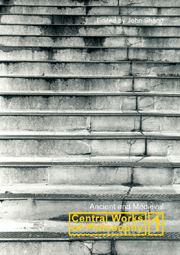Book contents
- Frontmatter
- Contents
- Contributors
- Preface
- Ancient and Medieval Philosophy: Introduction
- 1 Plato: Republic
- 2 Aristotle: Nicomachean Ethics
- 3 Lucretius: On the Nature of the Universe
- 4 Sextus Empiricus: Outlines of Pyrrhonism
- 5 Plotinus: The Enneads
- 6 Augustine: City of God
- 7 Anselm: Proslogion
- 8 Aquinas: Summa Theologiae
- 9 Duns Scotus: Ordinatio
- 10 William of Ockham: Summa Logicae
- Index
9 - Duns Scotus: Ordinatio
- Frontmatter
- Contents
- Contributors
- Preface
- Ancient and Medieval Philosophy: Introduction
- 1 Plato: Republic
- 2 Aristotle: Nicomachean Ethics
- 3 Lucretius: On the Nature of the Universe
- 4 Sextus Empiricus: Outlines of Pyrrhonism
- 5 Plotinus: The Enneads
- 6 Augustine: City of God
- 7 Anselm: Proslogion
- 8 Aquinas: Summa Theologiae
- 9 Duns Scotus: Ordinatio
- 10 William of Ockham: Summa Logicae
- Index
Summary
Duns Scotus's life and works
Beyond a few details, little is known of the life of John Duns Scotus (c.1266–1308). Both the generally accepted date and place of his birth are speculative. According to scholars, 1266 is most likely, given one date that is secure, namely, that of his ordination to the priesthood in Northampton on 17 March 1291. Under canon law, 25 was the earliest age allowable for ordination. The Bishop of Lincoln (in whose huge diocese both Northampton and Oxford were then located) conducted an earlier ordination on 23 December 1290. Thus, assuming that Scotus was ordained at the first opportunity, this makes his birth sometime between late December 1265 and mid-March 1266. Scholars now hold that the “Duns” in his name should be understood to refer to the town of Duns just north of the border between England and Scotland, in Berwickshire, curiously only a few miles away from Hume's birthplace.
His ordination in Northampton implies that Scotus was in Oxford by 1291. Another concrete reference places Scotus in Oxford in 1300. Scotus's name appears in a letter, dated 26 July, as one of 22 friars presented to the bishop of Lincoln for a licence to hear confessions. The list of names includes Philip Bridlington as the incoming Franciscan regent master (i.e. full professor) in theology. Bridlington was regent master for the year 1300–1301. And we know that Scotus took part in a disputation under Bridlington during this year.
- Type
- Chapter
- Information
- Central Works of Philosophy , pp. 217 - 241Publisher: Acumen PublishingPrint publication year: 2005
- 1
- Cited by

